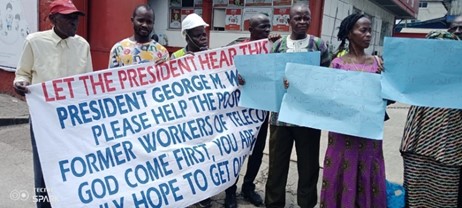Dozens of internet users who participated in a three-week training of the Liberia Internet Society School of Governance have unanimously agreed to stage a peaceful march/protest at the National Legislature in demand of clarity on the delay of the passage of the Cybersecurity Act, which was submitted to that august body since 2016.
Cyber laws are laws that provide legal protection to the internet users against multitude of complexities and legal issues emerging every now and then. The ever-expanding cyberspace has further given way to the specialized branch of law known as cyber law, which provides cyber protection to every industry and organization.
According to the group of young Liberian and information technology specialists, it is very unfortunate that the Legislature and policymakers will be delaying to pass relevant documents like the Cybersecurity Act, which protect the country and every internet user from cyber crime and all those responsible for any action thereof.
“We will have to march to the Legislature again to know the status of the Cybersecurity Act that was drafted by us along with the Ministry of Post and Telecommunication. We have to pass this law so that we can be protected online and also create more jobs for Liberians in the ICT sector. We will not rest until this law is passed because it is freedom and liberty that will hold internet cybersecurity hackers responsible for anything they do to us,” they noted.
Internet Society Liberia Chapter over the weekend climaxed the third edition of the Liberia School of Internet Governance (LSIG). The theme of the program was “Connecting People and Safeguarding Human Rights in Liberia”.
Speaking in an interview with journalists at the end of the training at a local hotel in Monrovia on Friday, August 27, 2022, and also expanding on the decisions, Matthew Roberts, President of the Internet Society Liberia Chapter, said that the passage of the Cybersecurity Law is critical as it intended to create more job opportunities for Liberians and protect the country in the digital space.
According to Roberts, the law, if passed, will prevent people from hacking because if anyone is caught they could be sued and jailed because the country would have laws to prosecute cyber criminals and cybercrime. He added that currently Liberia is vulnerable in the digital space. “We can’t sue hackers because we do not have any cybersecurity law to do so,” he stated.
“People are not responsible for their action, neither prosecuted under our law for cybercrimes because we do not have any law. Liberia is vulnerable in the digital space because there is no law to protect the rights of citizens and internet users in the country. We have trafficking in person that is done by the internet, data protection, hacking and other sensitive things that this law will prohibit,” he disclosed.
Roberts disclosed that there was a case between Lonestar Cell MTN and then Cellcom GSM: Cellcom was accused of shutting down and hacking Lonestar’s system to get more customers, and it was done by a British man. “We did not prosecute the person because there is no law,” he said.
He also named the illegal transfer of and stealing of date by Facebook, Google and other social media platforms “but Liberia cannot take action because we do not have any law that we can prosecute them under.
“Sometimes you hear that Facebook and Google are sued in other countries because of this cybersecurity law and data protection act, and this can happen in Liberia. We need the law to take action so that our rights can be respected. We have to create more jobs by observation of the digital space to monitor hacking going out in our country and have people sued,” he noted.







